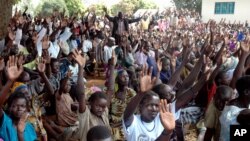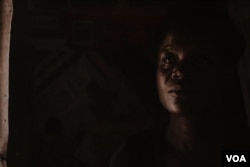Earlier this year, the Ugandan government once again extended a law giving amnesty to former rebels of the Lord's Resistance Army (LRA). In northern Uganda, victims and perpetrators of violence dating back to 1987 now live side by side. It's not always easy.
Florence Ayot sweeps the ground in front of her hut. She lives here with her two children, whom she had with Dominic Ongwen, a former senior commander of the Lord’s Resistance Army, LRA.
In January, Ongwen was captured and sent to The Hague where he faces 67 counts of war crimes and crimes against humanity.
“It hurts me to know that Dominic did not receive amnesty," said Florence, adding that she, Dominic and many others were abducted by the LRA as children.
Florence was taken in 1989. She was nine years old. In 2005, she managed to escape and received amnesty.
“People talk about me behind my back. My children get picked on in school,” she said. “I have explained to my children what their father did and why he is not with us. I don’t have a lot of money, so sometimes I can’t pay for school fees.”
There is continued debate in Uganda: What to do about the thousands of children who were conscripted by the rebel group?
Archbishop of Gulu John Baptist Odama was part of efforts to negotiate a peace deal with the LRA in 2006.
“Some families were torn apart. Some clans were torn apart. And the population was in pieces we could say. Those who were there, some of them were not really by will. They were taken by force. The people felt we must restore our relations by forgiveness, including Kony himself. So let the society of Acholi be restored,” he said.
Today, Gulu is a beehive of activity with people going to work, roads being constructed and music playing on every street corner.
Wounds of the war
The wounds of the now 30-year-old war can be quite difficult to see but they are there.
“What we find is that many people do suffer from post-traumatic stress disorder and the symptoms of that are often that the memories of the past are intruding in your everyday life," explained Annette Pheiffer, a German psychologist who has worked with people affected by the LRA conflict for the past eight years.
"So that could be if you’re on the market, for example, and what’s very normal here is that you see a goat being slaughtered, that the blood of the goat reminds you about the atrocities that happened during the abduction," she added. “The thing is, the word perpetrator here is not that easy, it’s not so much black-and-white, because most of the people were forcefully abducted and forced to kill. So I -- from a psychological perspective -- I would not call them perpetrators, they’re also victims."
But the war had many victims, not just those who were abducted.
“I lost so many relatives. I lost my father in the war as well. So to me, this left a very big gap in my life,”said Ivan Ruchay who supports amnesty. “We need to build our society, that’s why were not really bothered about creating more grudge. We are more of solving problems. I feel that’s the only way we can resolve a conflict."
But for many here, forgiveness is just the first challenge.





